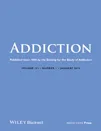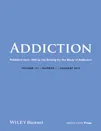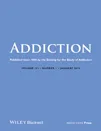 Accueil
Accueil
Détail de l'auteur
Auteur J. HOLMES |
Documents disponibles écrits par cet auteur (18)
 Ajouter le résultat dans votre panier Faire une suggestion Affiner la recherche
Ajouter le résultat dans votre panier Faire une suggestion Affiner la recherche
Article : Périodique
AIMS: To describe gender differences in alcohol consumption, purchasing preferences and alcohol-attributable harm. To model the effects of alcohol pricing policies on male and female consumption and hospitalizations. DESIGN: Epidemiological si[...]![All drinking is not equal: how a social practice theory lens could enhance public health research on alcohol and other health behaviours [Addiction debate]](https://bdoc.ofdt.fr/img_cache/pmb_ofdt_record_79858.webp)
Article : Périodique
Background: The social meanings, settings and habitual nature of health-related activities and their integration into our daily lives are often overlooked in quantitative public health research. This reflects an overly individualized approach to[...]
Article : Périodique
C. ANGUS ; R. PRYCE ; J. HOLMES ; F. DE VOCHT ; M. HICKMAN ; P. MEIER ; A. BRENNAN ; D. GILLESPIE |BACKGROUND AND AIMS: When measuring inequalities in health, public health and addiction research has tended to focus on differences in average life-span between socio-economic groups. This does not account for the extent to which age of death va[...]
Article : Périodique
BACKGROUND AND AIMS: The World Health Organization recommends increasing alcohol taxes as a 'best-buy' approach to reducing alcohol consumption and improving population health. Alcohol may be taxed based on sales value, product volume or alcohol[...]![Declining drinking among adolescents: Are we seeing a denormalisation of drinking and a normalisation of non-drinking? [Addiction opinion and debate]](https://bdoc.ofdt.fr/img_cache/pmb_ofdt_record_84918.webp)
Article : Périodique
G. CALUZZI ; M. LIVINGSTON ; J. HOLMES ; S. MACLEAN ; D. LUBMAN ; P. DIETZE ; R. VASHISHTHA ; R. HERRING ; A. PENNAY |BACKGROUND: In the early 2000s, alcohol use among young people began to decline in many western countries, especially among adolescents (ages between 12-17 years old). These declines have continued steadily over the past two decades, against the[...]
Article : Périodique
J. RANINEN ; M. LIVINGSTON ; J. HOLMES ; J. SVENSSON ; P. LARM |Youth drinking has declined in many high-income countries for two decades. This development is still largely unexplained. Developing evidence and extending our understanding as to the mechanisms behind these changes is imperative for advising go[...]
Article : Périodique
A. BRENNAN ; C. ANGUS ; R. PRYCE ; P. BUYKX ; M. HENNEY ; D. GILLESPIE ; J. HOLMES ; P. S. MEIER |AIMS: Evidence exists on the potential impact of national level minimum unit price (MUP) policies for alcohol. This study investigated the potential effectiveness of implementing MUP at regional and local levels compared with national implementa[...]
Article : Périodique
Aims: Dry January is a national multimedia campaign in the UK that encourages people to abstain from drinking alcohol during the month of January. The population-level campaign makes extensive use of email and social media to support participant[...]
Article : Périodique
A. BHATTACHARYA ; C. ANGUS ; R. PRYCE ; J. HOLMES ; A. BRENNAN ; P. S. MEIER |AIMS: To understand the extent of the alcohol industry's financial dependence on drinking above government low-risk guidelines in England. DESIGN: Scenario modelling using descriptive analyses of pooled data from the 2013 and 2014 waves of two[...]![How should we set consumption thresholds for low risk drinking guidelines? Achieving objectivity and transparency using evidence, expert judgement and pragmatism [Addiction debate]](https://bdoc.ofdt.fr/img_cache/pmb_ofdt_record_81737.webp)
Article : Périodique
J. HOLMES ; C. ANGUS ; P. S. MEIER ; P. BUYKX ; A. BRENNAN |Most high-income nations issue guidelines on low-risk drinking to inform individuals' decisions about alcohol consumption. However, leading scientists have criticized the processes for setting the consumption thresholds within these guidelines f[...]![Is minimum unit pricing for alcohol having the intended effects on alcohol consumption in Scotland? [Addiction opinion and debate]](https://bdoc.ofdt.fr/img_cache/pmb_ofdt_record_86178.webp)
Article : Périodique
BACKGROUND AND AIMS: The Scottish Government introduced minimum unit pricing (MUP) for alcohol on 1 May 2018. This means retailers in Scotland cannot sell alcohol to consumers for less than £0.50 per unit (1 UK unit = 8 g ethanol). The Governmen[...]
Article : Périodique
J. HOLMES ; P. S. MEIER ; A. BOOTH ; A. BRENNAN |Issues: Effectiveness of alcohol policy interventions varies across times and places. The circumstances under which effective polices can be successfully transferred between contexts are typically unexplored with little attention given to develo[...]
Article : Périodique
The decline in youth drinking in England - is everyone drinking less? A quantile regression analysis
M. OLDHAM ; S. CALLINAN ; V. WHITAKER ; H. FAIRBROTHER ; P. CURTIS ; P. MEIER ; M. LIVINGSTON ; J. HOLMES |BACKGROUND AND AIMS: Youth alcohol consumption has declined significantly during the past 15 years in many high-income countries, which may have significant public health benefits. However, if the reductions in drinking occur mainly among lighte[...]
Article : Périodique
A. PENNAY ; J. TORRONEN ; M. D. HEROLD ; L. FENTON ; S. MACLEAN ; G. CALUZZI ; H. FAIRBROTHER ; V. A. FRANK ; E. SAMUELSSON ; J. HOLMES |Introduction: Significant declines in drinking among young people have been recorded in many high-income countries over the past 20 years. This analysis explored the role of gender - which we interpret as socially constructed and relational - to[...]
Article : Périodique
Y. MENG ; J. HOLMES ; D. HILL-McMANUS ; A. BRENNAN ; P. S. MEIER |Background and aims: British alcohol consumption and abstinence rates have increased substantially in the last 3 decades. This study aims to disentangle age, period and birth cohort effects to improve our understanding of these trends and sugges[...]




